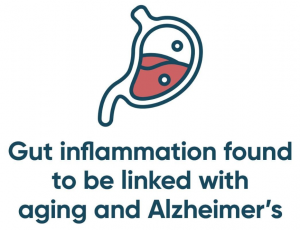The Association Between Gut Inflammation, Aging, and Alzheimer’s Disease Pathology
In recent years, the relationship between gut microbiota and neurological diseases has become a research hotspot. More and more evidence shows that intestinal inflammation (such as leaky gut and dysbiosis) may affect the progression of neurodegenerative diseases, especially Alzheimer’s disease (AD), through the “gut-brain axis”. This article reviews how intestinal inflammation increases with age and explores its potential association with AD pathology (such as β-amyloid deposition and neuroinflammation), providing new ideas for early intervention of AD.
1. Introduction
Alzheimer’s disease (AD) is the most common neurodegenerative disorder, characterized by β-amyloid (Aβ) plaques and hyperphosphorylated tau protein. Although genetic factors (e.g., APOE4) are major AD risk factors, environmental influences (e.g., diet, gut health) may also contribute to AD progression through chronic inflammation. The gut, as the body’s largest immune organ, may influence brain health through multiple pathways, particularly during aging.
2. Gut Inflammation and Aging
2.1 Age-related decline in intestinal barrier function
With age, the integrity of the intestinal barrier decreases, leading to “leaky gut”, allowing bacterial metabolites (such as lipopolysaccharide, LPS) to enter the blood circulation, triggering systemic low-grade inflammation. Studies have shown that the diversity of intestinal flora in the elderly decreases, pro-inflammatory bacteria (such as Proteobacteria) increase, and anti-inflammatory bacteria (such as Bifidobacterium) decrease, further exacerbating the inflammatory response.
2.2 Inflammatory factors and aging
Chronic low-grade inflammation (“inflammatory aging”, Inflammaging) is an important feature of aging. Intestinal inflammatory factors (such as IL-6, TNF-α) can enter the brain through the blood circulation, activate microglia, promote neuroinflammation, and accelerate the pathological process of AD.
and promoting neuroinflammation, thereby accelerating AD pathology.
3. The Link Between Gut Inflammation and Alzheimer’s Disease Pathology
3.1 Gut Dysbiosis and Aβ Deposition
Animal models have shown that intestinal flora disturbance can increase Aβ deposition. For example, antibiotic-treated mice have reduced Aβ plaques, while Aβ levels are increased in mice with dysbiosis. Certain bacterial metabolites (such as short-chain fatty acids, SCFAs) may affect Aβ clearance by regulating microglial function.
3.2 The Gut-Brain Axis and Neuroinflammation
Gut inflammation can affect the brain via vagal, immune system, and metabolic pathways:
- Vagal pathway: intestinal inflammatory signals are transmitted via the vagus nerve to the CNS, affecting hippocampal and prefrontal cortex function.
- Systemic inflammation: Bacterial components such as LPS activate microglia and promote neuroinflammation, exacerbating tau pathology and neuronal damage.
- Metabolic effects: gut dysbiosis may affect tryptophan metabolism, leading to imbalances in neurotransmitters (e.g., 5-HT) and affecting cognitive function.
3.3 Clinical Evidence
- Patients with AD have a significantly different composition of gut flora than healthy older adults, e.g., an abnormal ratio of Thick-walled phylum/Antibacterial phylum.
- Blood levels of LPS are positively correlated with AD severity.
- Probiotic interventions (e.g. Bifidobacterium bifidum) reduce Aβ deposition and improve cognitive function in animal models.
4. Potential Intervention Strategies
Dietary modifications: a high-fiber, Mediterranean diet may promote the growth of beneficial bacteria and reduce inflammation.
- Probiotics/Prebiotics: supplementation with specific strains of bacteria (e.g., Lactobacillus, Bifidobacterium) may improve gut barrier function.
- Anti-inflammatory treatments: drugs that target gut inflammation (e.g., TLR4 inhibitors) may slow AD progression.
- Lifestyle interventions: exercise and stress reduction may maintain gut flora balance
5. Conclusion and Future Perspectives
Gut inflammation increases with age and may contribute to AD pathology through the gut-brain axis. Future studies should further clarify the causal relationship between specific flora and AD and explore AD prevention and treatment strategies based on gut flora regulation. Research in this area may provide new targets for early intervention in neurodegenerative diseases.
Xiamen Baysen Medical We Baysen Medical is always focus on diagnostic technique to improve the quality of life . We have developed 5 technology platforms- Latex , colloidal gold , Fluorescence Immunochromatographic Assay , Molecular,Chemiluminescence Immunoassay. We focus on gut health, and our CAL test is used to detect inflammation in the gut.
References :
- Vogt, N. M., et al. (2017). “Gut microbiome alterations in Alzheimer’s disease.” Scientific Reports.
- Dodiya, H. B., et al. (2020). “Chronic gut inflammation exacerbates tau pathology in a mouse model of Alzheimer’s disease.” Nature Neuroscience.
- Franceschi, C., et al. (2018). “Inflammaging: a new immune–metabolic viewpoint for age-related diseases.” Nature Reviews Endocrinology.
Post time: Jun-24-2025






